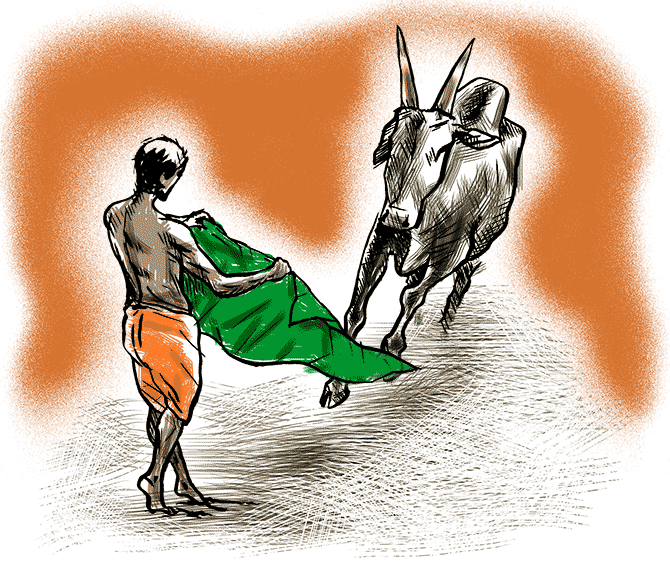'Is he one who defends individual liberty at all costs, or is he one who allows some give and take that recognises the primacy of the social contract, our coming together to live in a society?' asks Vikram Johri.
Illustration: Dominic Xavier/Rediff.com

Many writers I admire, such as Ali A Rizvi, maintain that in these fraught times we should be clear about the difference between religion and those who practise a faith.
It's right, for example, to criticise Islam, but wrong to demonise Muslims, since Islam is merely an ideology, while those who practise it are real individuals with rights.
Practising Muslims may not look upon their faith as mere ideology, but Ali's injunction is a good starting point for a liberal discourse.
Recently, Newslaundry carried a piece that detailed B R Ambedkar's views on Muslims in the run-up to India's Independence and Partition.
As was Ambedkar's wont, he wrote about the ills of religion, in this case Islam, as he did with Hinduism, by refracting his ideas through those who practise the faith.
Some of his comments are pretty damning in that they portray the Muslim population in pre-Independence India as governed solely by the idea of fighting the hegemony of the Hindus.
This raises two questions. One, how does one write about a topic where the lines often blur between an abstract idea and its real adherents, without coming across as a bigot?
Ambedkar may not have been entirely right about the Muslim situation -- indeed, the success of India as a Republic attests to the failure of the two-nation theory -- but his larger point about religion mobilising Muslims to ask for a separate State was borne out by subsequent events.
These impulses have only grown stronger in the interim.
Since the issue has been in the news, consider Kashmir.
The rise of unrest in the Valley over the recent past has been attributed to, among other factors, the rapid spread of Islamism.
Islamic State flags have made an appearance and money from Pakistan and China is believed to be fuelling the protests.
The problem is old and complex, but political mobilisation in the valley is believed to have hastened on the back of a change of power equations in the state since the last election, which installed a Peoples Democratic Party-Bharatiya Janata Party combine.
With greater representation of Jammu, where a number of BJP MLAs hail from, in the government, some commentators have put down the latest disturbance to a dissolution of the absolute power that Muslims, the majority in the valley, have hitherto enjoyed.
Globally, too, we notice an intermingling of political Islam with the lives of ordinary Muslims.
From Chechnya, whose leader has called for the extermination of gays, to the rising threat of terror in Europe, it is becoming increasingly difficult to separate Islamism from Islam and Muslims.
How then do we entirely divorce a people from a faith when the political, social and cultural actions of the people are governed by the faith?
Second -- and this follows from one above -- when we ask that a community not be demonised, are we asking that its adherents not be marginalised for following essentially apolitical practices, like wearing the niqab (as in France) or eating beef (India)?
But even such apparently innocuous actions can translate to politically fraught debates.
The idea of covering the face may strike some as deeply misogynistic and incongruous with ideas of Western liberal tradition.
Similarly, the idea of eating beef can be deeply offensive in a country where the majority holds the cow sacred.
To be sure, Hinduism is not immune to such intolerant impulses.
Mobilisation in the name of religion has a tendency to quickly spill over into violence, as the lynching of Pehlu Khan in Rajasthan demonstrated.
Respect for the cow -- what Swapan Dasgupta evocatively called 'common decencies' -- turned into something much darker.
Luckily, such tendencies are not displayed on a large scale in India and are quickly checked by the web of political and social censure that operates here.
Such warring instincts bring us to the ultimate question: Who is a liberal?
Is he one who defends individual liberty at all costs, or is he one who allows some give and take that recognises the primacy of the social contract, our coming together to live in a society?
On the niqab wearing, especially, we see a direct conflict between these two ideals: A woman's right to do what she wishes versus the larger question of how her choice may be informed by social and religious codes that are, in themselves, illiberal.
Of course, there are no easy answers to these questions.
Even the fence-sitters among us find ourselves drawn to one side or the other in these conflicts, sides that, on introspection, reveal how we get blindsided by our own mix of emotions, politics, and perhaps even prejudices.












 © 2025
© 2025